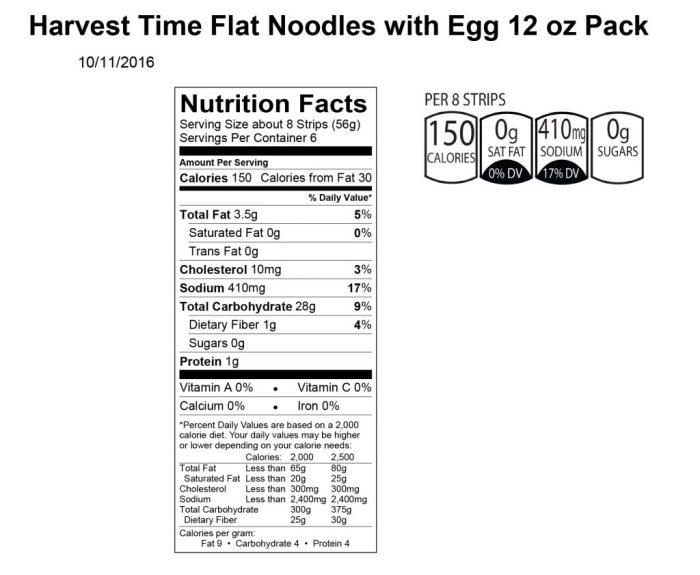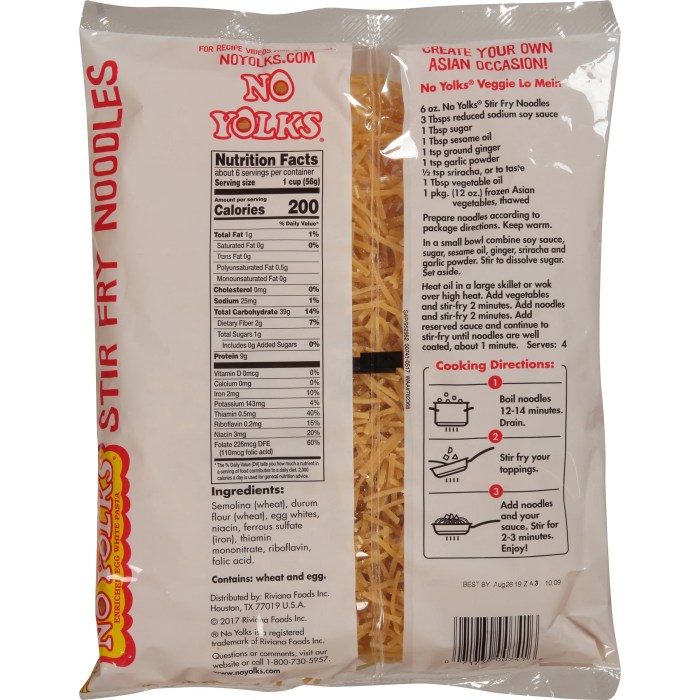Nutritional Composition of Egg Noodles
Egg noodles nutrition facts – Egg noodles, a staple in many cuisines, offer a convenient and relatively inexpensive source of carbohydrates. However, their nutritional profile varies depending on ingredients and preparation methods. Understanding this composition is crucial for making informed dietary choices.
Macronutrient Breakdown in Egg Noodles
A typical serving of cooked egg noodles (approximately 1 cup) provides a substantial amount of carbohydrates, a moderate amount of protein, and a relatively low amount of fat. The exact amounts fluctuate based on the type of noodle (fresh, dried, whole wheat) and any added ingredients. Generally, a serving contains approximately 40-50 grams of carbohydrates, 5-8 grams of protein, and 1-3 grams of fat.
Fiber content is typically low, ranging from 1-3 grams per serving, and sugar content is minimal, usually less than 1 gram. These values represent averages and may vary based on brand and preparation.
Vitamin and Mineral Content of Egg Noodles
Egg noodles are a source of several essential vitamins and minerals, although they are not typically considered a nutrient-dense food. They contain B vitamins, particularly riboflavin (B2) and niacin (B3), which are crucial for energy metabolism. A serving may also provide small amounts of iron and folate, important for red blood cell production and cell growth. The exact quantities of these micronutrients depend on the ingredients used in the noodle production.
For instance, enriched egg noodles often contain added iron and B vitamins.
Variations in Nutritional Content Across Egg Noodle Types
Different types of egg noodles exhibit variations in their nutritional profiles. Fresh egg noodles, often made with higher-quality ingredients and fewer preservatives, may contain slightly more protein and fewer carbohydrates compared to their dried counterparts. Whole wheat egg noodles, incorporating the entire wheat kernel, offer a significant boost in fiber content and may provide more essential vitamins and minerals, including magnesium and selenium.
Dried egg noodles, while convenient, sometimes contain added preservatives and may have a slightly lower nutritional value than fresh options.
Nutritional Information Table for a Standard Serving of Egg Noodles
| Nutrient | Amount per Serving (1 cup cooked) | % Daily Value (DV)* | Notes |
|---|---|---|---|
| Calories | 200-250 | Variable | Dependent on type and added ingredients |
| Carbohydrates | 40-50g | 13-17% | Mostly complex carbohydrates |
| Protein | 5-8g | 10-16% | Provides essential amino acids |
| Fat | 1-3g | 2-4% | Mostly unsaturated fats |
| Fiber | 1-3g | 4-12% | Higher in whole wheat varieties |
| Sugar | <1g | <1% | Naturally occurring sugars |
| Iron | 1-2mg | 6-11% | Higher in enriched varieties |
| Folate | 5-10mcg | 2-5% | Essential for cell growth |
| Riboflavin (B2) | 0.1-0.2mg | 7-14% | Important for energy metabolism |
| Niacin (B3) | 1-2mg | 6-11% | Contributes to energy production |
Percent Daily Value (%DV) is based on a 2,000 calorie diet. Individual needs may vary.
Egg Noodles in a Balanced Diet

Egg noodles, while a source of carbohydrates, can be a valuable component of a balanced and healthy diet when consumed in moderation and paired with nutrient-rich foods. Their contribution to a healthy eating plan hinges on portion control and mindful selection of accompanying ingredients. Overconsumption, like with any carbohydrate source, can lead to excess calorie intake and potential weight gain.Egg noodles provide energy through carbohydrates, but lack significant amounts of other essential nutrients.
Therefore, their role in a balanced diet lies in their ability to complement other food groups, creating complete and satisfying meals. A balanced approach ensures that the overall dietary intake meets the body’s needs for vitamins, minerals, proteins, and healthy fats.
Incorporating Egg Noodles into Healthy Meals
Strategic incorporation of egg noodles into healthy meals involves focusing on balancing their carbohydrate content with proteins, healthy fats, and a variety of vegetables. This approach maximizes nutritional value and minimizes potential drawbacks associated with high-carbohydrate consumption. For instance, adding a substantial serving of lean protein, such as grilled chicken or tofu, alongside a generous portion of colorful vegetables significantly enhances the nutritional profile of a noodle dish.
The protein promotes satiety and provides essential amino acids, while the vegetables contribute vitamins, minerals, and fiber.
Example Meal Incorporating Egg Noodles
A balanced meal featuring egg noodles could consist of: A serving (approximately 1 cup cooked) of egg noodles tossed with 4 ounces of grilled chicken breast, 1 cup of steamed broccoli florets, ½ cup of sliced bell peppers, and a light dressing made from 1 tablespoon of olive oil, 1 tablespoon of lemon juice, and a sprinkle of herbs.
This meal provides a good balance of carbohydrates from the noodles, lean protein from the chicken, and vitamins, minerals, and fiber from the vegetables. The olive oil contributes healthy fats, and the lemon juice adds flavor while offering a source of vitamin C. This meal demonstrates how egg noodles can be integrated into a nutritious and satisfying meal.
This is just one example; numerous variations are possible depending on individual dietary preferences and needs.
Allergens and Dietary Considerations

Egg noodles, a staple in many cuisines, present both nutritional benefits and potential challenges depending on individual dietary needs and restrictions. Understanding the potential allergens and considering their suitability within various dietary plans is crucial for informed food choices.Egg noodles, as the name suggests, contain eggs. This makes them unsuitable for individuals with egg allergies, a potentially serious condition ranging from mild skin reactions to life-threatening anaphylaxis.
Furthermore, many commercially produced egg noodles contain wheat flour, introducing another potential allergen for those with celiac disease or gluten intolerance. The presence of soy lecithin as an emulsifier in some brands is another factor to consider for individuals with soy allergies. Careful label reading is therefore paramount.
Egg Allergies and Intolerances
Individuals with egg allergies must strictly avoid egg noodles. Even trace amounts of egg protein can trigger allergic reactions, the severity of which varies greatly from person to person. Symptoms can include hives, itching, swelling, digestive upset, and in severe cases, difficulty breathing or anaphylactic shock. Always check product labels meticulously for the presence of egg and other potential allergens, and consult with an allergist or doctor for personalized advice and management strategies.
Substituting egg-free noodles, such as rice noodles or gluten-free pasta made from alternative flours, is necessary for individuals with egg allergies.
Suitability for Various Dietary Restrictions
The suitability of egg noodles for various dietary restrictions is complex and depends heavily on the specific brand and ingredients.
Gluten-Free Diets
Standard egg noodles typically contain wheat flour, making them unsuitable for individuals following a gluten-free diet. However, some manufacturers produce egg noodles using gluten-free flours such as rice flour or tapioca starch. Always verify the ingredient list to ensure the absence of wheat, barley, or rye. Cross-contamination during manufacturing is also a concern; look for products specifically labeled as gluten-free and produced in facilities that avoid cross-contamination with gluten-containing products.
Low-Carb Diets
Egg noodles, like most pasta, are relatively high in carbohydrates. While they may fit into a moderate-carb diet, they are generally not suitable for very low-carb diets like ketogenic diets. Individuals following such diets may need to opt for low-carb alternatives like shirataki noodles or zucchini noodles.
Vegetarian Diets
Standard egg noodles are generally acceptable for vegetarians, as they contain eggs, a non-meat protein source. However, some vegetarians choose to avoid eggs for ethical or other reasons. In such cases, egg-free noodle alternatives are readily available.
Egg noodles, while delicious, are primarily carbs. Understanding their nutritional profile is key to balanced eating, much like knowing the nutritional details of other foods. For instance, comparing them to the protein and calcium content found in yoplait yogurt nutrition facts highlights the differences in macronutrient composition. Ultimately, both egg noodles and yogurt play a part in a varied diet, depending on individual needs.
Common Egg Noodle Brands and Allergen Information
| Brand Name | Egg | Wheat | Soy |
|---|---|---|---|
| Brand A | Yes | Yes | May Contain |
| Brand B | Yes | Yes | No |
| Brand C (Gluten-Free) | Yes | No | No |
| Brand D (Egg-Free) | No | Yes | May Contain |
Glycemic Index and Blood Sugar: Egg Noodles Nutrition Facts

Egg noodles, like other carbohydrate-containing foods, impact blood sugar levels. Understanding their glycemic index (GI) and how to incorporate them into a balanced diet is crucial for managing blood glucose, particularly for individuals with diabetes or those aiming to maintain healthy blood sugar levels.The glycemic index of egg noodles varies depending on factors such as the type of flour used (e.g., durum wheat versus all-purpose flour), cooking method, and the presence of other ingredients.
Generally, egg noodles have a moderate to high glycemic index, ranging from approximately 50 to 70. This means they can cause a relatively rapid rise in blood sugar compared to low-GI foods. However, this rise is typically less dramatic than that caused by high-GI foods like white bread or sugary drinks.
Egg Noodle Consumption and Blood Sugar Regulation
The relationship between egg noodle consumption and blood sugar regulation is complex. The amount of egg noodles consumed, the overall composition of the meal (including fiber, protein, and fat content), and individual metabolic factors all play a significant role. Consuming a large portion of egg noodles alone will likely lead to a more pronounced blood sugar spike compared to consuming a smaller portion as part of a balanced meal.
The presence of protein and fat in a meal containing egg noodles can slow down the rate of glucose absorption, thus moderating the blood sugar response. For example, adding vegetables and lean protein to a noodle dish creates a more balanced meal, reducing the overall glycemic load.
Managing Blood Sugar Levels with Egg Noodles, Egg noodles nutrition facts
To effectively manage blood sugar levels when including egg noodles in a meal plan, several strategies can be implemented. Portion control is essential. Opting for smaller portions of egg noodles can significantly reduce the impact on blood glucose. Combining egg noodles with high-fiber foods, such as vegetables (broccoli, spinach, carrots) and legumes, helps slow down digestion and reduce the rate of glucose absorption.
Furthermore, including a source of protein (chicken, fish, tofu) in the meal helps to further regulate blood sugar levels by slowing down the release of glucose into the bloodstream. Choosing whole wheat egg noodles, when available, can also slightly lower the GI compared to those made from refined flour. Finally, regular physical activity is crucial in managing blood sugar levels regardless of dietary choices.
Consistent exercise improves insulin sensitivity, making it easier for the body to regulate blood glucose effectively.
FAQ
Are egg noodles gluten-free?
No, traditional egg noodles contain wheat flour and are therefore not gluten-free. Look for specifically labeled gluten-free egg noodles if you have celiac disease or a gluten intolerance.
How many calories are in a serving of egg noodles?
The calorie count varies depending on the serving size and type of egg noodle. A typical serving (around 1 cup cooked) can range from 200-250 calories.
Can I eat egg noodles if I’m diabetic?
Egg noodles, like other refined carbohydrates, can affect blood sugar levels. Consume them in moderation and as part of a balanced meal with protein and fiber to help regulate blood sugar.
Are egg noodles a good source of protein?
Egg noodles provide some protein, but they are not a primary protein source. The protein content is relatively low compared to other foods like meat, beans, or lentils.
